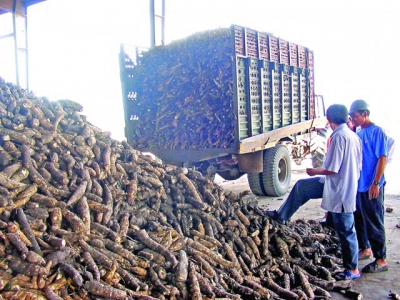Vietnam mastering extraction of Nano cellulose from cassava

A Hanoi University of Science and Technology research group has conducted a scientific study on the potential of Nano cellulose from cassava bagasse for use by the pharmaceutical and food industries. The study was ordered by the Ministry of Industry and Trade within the framework of a biotechnology application and development project in the processing sector.
Great potential
Cassava is an important industrial crop, contributing to the development of animal feed, food, paper, textile, alcohol and medicine. Vietnam currently ranks fourth in cassava production in the region, with high export turnover (more than US$1.2 billion in 2017).
In addition to the finished product, the current production process of cassava starch creates a large amount of cassava bagasse - the dry pulpy residue left after the extraction of the cassava from its root. A part of this by-product is used for the production of animal feed and biogas, but much of it is not utilized and causes serious environmental pollution.
Due to its high content of organic matter, cassava bagasse is often used as organic fertilizer. Cassava bagasse is not only a by-product but also a potential source of material given its residue starch and high cellulose content. Therefore, the Ministry of Industry and Trade has cooperated with the Hanoi University of Science and Technology’s School of Biotechnology and Food Technology to conduct research on recovering residue starch and cellulose.
Success in Nano cellulose production
Nano cellulose technology is a completely new field in Vietnam. To produce Nano cellulose from cassava bagasse, residue starch must be recovered first to separate it from the cellulose. Cassava bagasse is then bleached to create Nano fibrillated cellulose (NFC) and Nano crystalline cellulose (NCC). According to test results, the recovery rate of NFC reached 60.2 percent, while that of NCC stood at 65 percent.
The Hanoi University of Science and Technology has coordinated with the National Institute of Drug Quality Control under the Ministry of Health to apply Nano cellulose in pharmaceutical production, and with the Hai Chau Co., Ltd. in cake production.
Nano cellulose has unique properties. It is strong with a large surface area, non-toxic, biodegradable and easily modified. Owing to these characteristics, it can be used to enhance the strength of paper, as fillers and additives to composites, super water absorbent material, flexible and transparent thin films, additives in cosmetics, oxygen barrier for food packaging and many more.
Experimental results show that NCC has potential use in stabilizers and emulsifiers, while NFC can be converted into thin films used in cosmetics thanks to good moisture and its resistance to UV rays.
Currently, the School of Biotechnology and Food Technology has completely mastered NCC and NFC production technologies. If research results are commercialized, it will contribute to increasing the production value and reducing environmental pollution for the cassava industry.
Related news
 Sustainable agriculture development in ASEAN integration
Sustainable agriculture development in ASEAN integration Improving the quality of agricultural products, ensuring farmers’ interests, and sustainably developing agriculture in ASEAN topped the agenda of a just
 Rubber exports increase significant but do not be subjective
Rubber exports increase significant but do not be subjective After the crisis period 2012-2016, since the second half of 2016, rubber exports have recorded positive signals when the volume as well as export value
 Vietnam spends heavily on fertilizer, pesticide imports
Vietnam spends heavily on fertilizer, pesticide imports Fertilizer and pesticide imports, especially from China, have amounted to nearly US$1.7 billion in the year to September, the Ministry of Agriculture
 Vietnam raises rice export target for 2017 amid rising orders
Vietnam raises rice export target for 2017 amid rising orders The Vietnam Food Association (VFA) has revised its rice export target for 2017 up to 5.6 million tonnes from the previous 5.2 million tonnes set in July
 Sustainable agriculture development in ASEAN integration
Sustainable agriculture development in ASEAN integration Improving the quality of agricultural products, ensuring farmers’ interests, and sustainably developing agriculture in ASEAN topped the agenda of a just